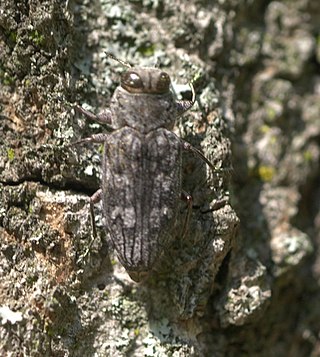
Polyphaga is the largest and most diverse suborder of beetles. It comprises 144 families in 16 superfamilies, and displays an enormous variety of specialization and adaptation, with over 350,000 described species, or approximately 90% of the beetle species discovered thus far.

Elateriformia is an infraorder of polyphagan beetles. The two largest families in this group are buprestids, of which there are around 15,000 described species, and click beetles, of which there are around 10,000 described species.

Buprestoidea is a superfamily of beetles.
Schizopodidae is a family of beetles, in the large suborder Polyphaga. It was a subfamily until 1991, when it was elevated to family status.
Dystaxia is a genus of beetles in the family Schizopodidae, containing the following species:
Glyptoscelimorpha is a genus of beetles in the family Schizopodidae, containing the following species:
Gracilocala bicolor is a species of beetle in the family Buprestidae, the only species in the genus Gracilocala.
Pachyschelus is a genus of metallic wood-boring beetles in the family Buprestidae. There are at least 270 described species in Pachyschelus.
Augrabies schotiaphaga is a species of beetle in the family Buprestidae, the only species in the genus Augrabies.

Chrysobothris is a genus of metallic wood-boring beetles in the family Buprestidae. There are at least 690 described species in Chrysobothris.
Knowltonia is a genus of beetles in the family Buprestidae, containing the following species:
Oaxacanthaxia is a genus of beetles in the family Buprestidae, containing the following species:
Roswitha is a genus of beetles in the family Buprestidae, containing the following species:
Vadonaxia peyrierasi is a species of beetle in the family Buprestidae, the only species in the genus Vadonaxia.
Cobosella laesicollis is a species of beetle in the family Buprestidae, the only species in the genus Cobosella.
Nothomorphoides irishi is a species of beetle in the family Buprestidae, the only species in the genus Nothomorphoides.
Eolampra gorgia is a fossil species of beetles in the family Buprestidae, the only species in the genus Eolampra.

Callirhipidae is a family of beetles, found widely throughout low-latitude regions except tropical Africa and Madagascar. There are around 175 species in 7 genera. The larvae bore into dead wood and generally have a life span of 2 or more years. The adults are generally nocturnal.

Elmidae, commonly known as riffle beetles, is a family of beetles in the superfamily Byrrhoidea described by John Curtis in 1830. Both adults and larvae are usually aquatic, living under rocks in fast-flowing shallow areas of streams, such as riffles, feeding on algae and biofilms. There are more than 150 genera and 1,500 described species in Elmidae. The oldest record of the group is Cretohypsilara from the Cenomanian aged Burmese amber.

Acmaeoderini is a tribe of metallic wood-boring beetles in the family Buprestidae. There are at least 4 genera and more than 560 described species in Acmaeoderini.






